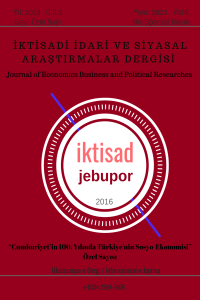Türkiye’de Finansal Gelişme ile Ekonomik Büyüme Bağlantısının Analizi: Genişletilmiş NARDL Yaklaşımı
Analyzing the Linkage Between Financial Development and Economic Growth in Türkiye: Augmented NARDL Approach
Author(s): Funda DurgunSubject(s): National Economy, Financial Markets, Public Finances, Socio-Economic Research
Published by: Haci Mustafa Paksoy
Keywords: Financial development; financial development index; nonlinear ARDL; augmented ARDL; Hatemi-J causality test;
Summary/Abstract: This study, which examines the assumption that the relationship between the financial development index, which is a comprehensive indicator of financial development, and economic growth may be asymmetric in Türkiye, covers the period 1980–2020. A non-linear autoregressive distributed lag bounds test (NARDL) was used to determine both the asymmetric relationship and the long- and short-run linkages between the variables. The cointegration relationship between the variables was also tested with the augmented ARDL approach. In the long run, the effect of positive shocks of the financial development index on growth is negative but insignificant, while the effect of negative shocks on growth is positive and significant. The results of the Hatemi-J asymmetric causality test revealed a unidirectional causality relationship from both positive and negative shocks of financial development to positive shocks of economic growth. This finding, contrary to the prevailing view in the literature, may be due to Türkiye's economic and financial structure. Türkiye, whose financial institutions and markets are behind developed countries, needs to build a healthy financial system, reduce income inequality and inflation, increase human capital investments in the financial sector, and ensure efficiency in resource allocation.
Journal: İktisadi İdari ve Siyasal Araştırmalar Dergisi (İKTİSAD)
- Issue Year: 8/2023
- Issue No: Spec. Iss.
- Page Range: 53-73
- Page Count: 21
- Language: Turkish

